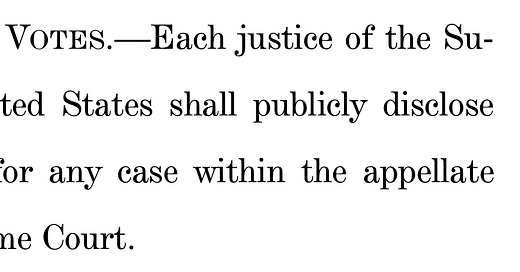Supreme Court Justices Should Have to Show Their Work
Some of the Court's most controversial and impactful decisions are officially unsigned. A new bill would change that going forward.
Earlier this week, Oregon Senator Ron Wyden introduced a court reform bill that might at long last drag the federal judiciary into the twenty-first century, kicking and screaming all the way.
The headline is a provision that would expand the Supreme Court from nine to 15 justices over a 12-year period, but there is a lot going on in here that has nothing to do with counting seats. The bill would, for example, split the sprawling Ninth Circuit Court of Appeals into slightly more manageable chunks, and break up the Fifth Circuit, home to the most strident reactionaries the Federalist Society has to offer. It would expand the perpetually overburdened federal district courts (101 new judgeships) and appeals courts (62 new judgeships), which Congress last bothered to do in 2002 and 1990, respectively. And it would impose on the Supreme Court a two-thirds requirement for striking down acts of Congress on a constitutional basis—a rule that would have, for example, prevented the conservative wing from declaring money to be political speech and the Voting Rights Act to be a form of reverse racism.
There’s one minor tweak that caught my eye, though, in part because it’s the sort of thing that feels like it should be table stakes for the highest court in the nation: a provision that would obligate each justice to say how they voted in each case that comes before them.
I’m going to write more about this next week in the context of the Court’s death penalty docket, which the justices routinely use to greenlight executions in two or (at most) three sentences on an anonymous basis. But these are just one type of case in which the justices hide behind bloodless, anodyne language to enact sweeping policy changes and/or overturn longstanding precedent. The 2020 decision that forced Wisconsin voters to vote in person during a deadly pandemic, for example, was issued on an unsigned basis. So, too, was the 2021 decision in which the justices lifted the Centers for Disease Control’s evictions moratorium, thus putting especially vulnerable people out on the street during, you guessed it, a deadly pandemic. In September 2021, when the Court allowed Texas’s cartoonishly unconstitutional anti-choice bounty hunter law to take effect, the only reason we can figure out which five justices were in the majority is that all four justices in dissent wrote separate opinions condemning it.
If you want to go back further, Bush v. Gore, in which five conservatives ended the counting of votes in Florida in order to hand the 2000 election to Republican George W. Bush, remains one of the Court’s most embarrassing and least defensible opinions. Thanks to the “per curiam” designation that appears at the top, officially, no justice today bears the stain of having written it.
There are many, many aspects of the federal judiciary that are insanely broken and require intervention, most of which are more significant than the potential imposition of more stringent rules for attributing opinion authorship. But this, to me, feels like the bare minimum level of transparency necessary in a semi-functioning democracy in which nine lawyers get to act as an unaccountable superlegislature for as long as they feel like it.
If the justices really cared about their evaporating legitimacy, they would stop cranking out reactionary jurisprudence that normal people do not like. Failing that, however, they should at least have to put their names on this shit. The only thing more demeaning than losing your civil rights is not knowing who thought so little of you that they felt comfortable taking your civil rights away in the first place.
As always, you can find everything we publish at ballsandstrikes.org, or follow us on Twitter at @ballsstrikes, or get in touch by emailing contact@ballsandstrikes.org. Thanks for reading.
This Week In Balls & Strikes
Ghost Guns Are Making the Gun Violence Crisis Worse. Will the Supreme Court Care?, Madiba Dennie
Are guns really “guns” if you have to spend a few minutes assembling them in your home? Soon, Sam Alito will get to decide!
Oklahoma Doesn’t Want to Execute Richard Glossip. Will the Supreme Court Force Them to Do It Anyway?, Madiba Dennie
Prosecutors are refusing to defend Richard Glossip’s 1997 murder conviction. But the Supreme Court gets to make its own decision.
This Week In Other Stuff We Appreciated
A Supreme Court Justice Warned That a Ruling Would Cause “Large-Scale Disruption.” The Effects Are Already Being Felt, Eli Sanders, ProPublica
In lower courts, the Loper Bright decision is robbing employees of overtime pay, enabling discrimination against trans people, and allowing megacorporations to keep ripping you off.
Georgia’s Election Is Headed for Potential Disaster. Thank the Supreme Court, Katherine Culliton-Gonzalez and Donald K. Sherman, Slate
John Roberts’s promise in Shelby County that racism in America was over may have been, in retrospect, a bit premature.






Thank you (and the sponsors of such legislation). Nothing in or about our Constitution gives federal judges “lifetime appointments.” Article III and The Federalist No. 78 emphasized that judges may hold their offices only during good behavior. Federal law and our Constitution establish how to distinguish good judicial behavior from bad judicial behavior. When judges knowingly violate rules of evidence or procedure or federal statutes, they necessarily knowingly violate our Constitution. They should be removed for such misconduct. The people have the right under the First Amendment to seek their removal. And many provisions of our Constitution give us the power to vote for or against any elected official who bears responsibility for appointing or not removing a judge who knowingly violates our Constitution. One way to prove judges are knowingly violating our Constitution is to compare what they write (or agree with) in different opinions.
Federal judges hiding their responsibility for their decisions is clearly contrary to the Constitution. SCOTUS opinions justifying the president’s power to appoint and remove officers (and regarding judges, the power of senators to approve or deny appointments and the power of senators and representatives to help remove judges) is justified by the power of the people to vote for or against elected officials because of the conduct of such appointees, including judges